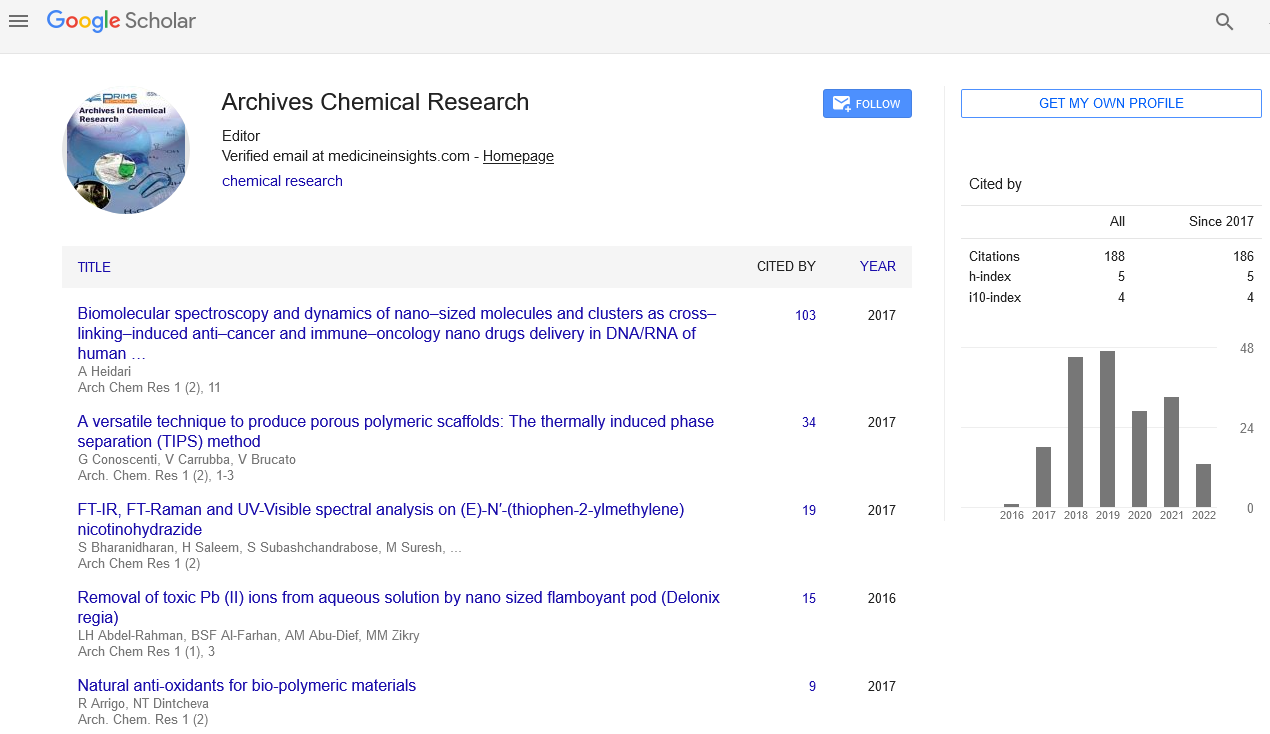Perspective - (2023) Volume 7, Issue 1
Advances in Heterothallic Catalyst Design Reactivity Patterns
Xinliang Lee*
Department of Chemistry, Fuzhou University, China
*Correspondence:
Xinliang Lee,
Department of Chemistry, Fuzhou University,
China,
Email:
Received: 31-Jan-2023, Manuscript No. IPACRH-23-15908;
Editor assigned: 02-Feb-2023, Pre QC No. IPACRH-23-15908 (PQ);
Reviewed: 16-Feb-2023, QC No. IPACRH-23-15908;
Revised: 21-Feb-2023, Manuscript No. IPACRH-23-15908 (R);
Published:
28-Feb-2023, DOI: 10.21767/2572-4657.23.07.001
Introduction
With sustainability at the forefront of current polymerization research,
the normally abundant, cheap and low toxic main group
metals on Earth are attractive candidates for catalysis. Main group
metals have been used in a wide range of polymerizations, from
classical alkene polymerization to the synthesis of new bio-derived
degradable polyesters and polycarbonates via ring-opening polymerization
and ring-opening copolymerization. This tutorial review
focuses on efficient polymerization catalysts based on group
1, group 2, zinc, and group 13 metals. Key mechanistic pathways
and catalyst development are discussed, including tailored ligand
design, heterothallic cooperatively, binary systems, and careful selection
of polymerization conditions. All of these can be used to
fine-tune the acidity of the metal Lewis and the polarity of the
metal-alkyl bond. On the effects of common environmental chemicals
on bone, from basic molecular insights to clinical implications.
Description
A truly sustainable plastic requires renewable raw materials combined
with efficient post-consumer production and recycling processes.
Some of the most useful degradable materials are aliphatic
polyesters, polycarbonates, and polyamides, often produced by
ring-opening polymerization using organometallic catalysts. Although
the development of ligands has been extensively studied,
heterothallic catalysts often have significantly improved activity
and selectivity compared to monometallic catalysts. Compounds
offer similarly promising but understudied strategies.
Poor waste management and uncontrolled consumption underpin
the current paradigm of plastic use which has been shown to be
unsustainable in the long term. Sexuality and versatility suggest
that even the concept of a plastic-free society is unsustainable. A
growing number of answers to this conundrum include research efforts focused on developing more sustainable plastics. Written
by a trained chemist, this report reflects a journey of academic
discovery that has led to the recognition of the importance of
improving and enabling the wider system in which plastics exist.
Initially, our focus was on the developing catalysts, as they are a
key driver of sustainability by improving the efficiency and ease
of polymerization. Metal catalysts with different ligand structures
and incorporated metals have been developed to produce common
polyesters such as poly (lactic acid) and polycaprolactone.
The central themes of this work were stereo control, efficiency and
versatility. These reports feature emphases on the end of life and
physical properties of polymers, which were increasingly important
themes as work shifted toward new methods of incorporating
functionality in polymers produced by ring-opening polymerization.
Conclusion
The first two rely upon the exploitation of olefin metathesis to
functionalize polyesters or polyether, and the third involves the
manipulation of ring-opening polymerization equilibrium to enable
selective monomer recovery from polyester. Our foundational
work on 1, 3-dioxolan-4-one monomers is then discussed
because this emerging class of molecules offers a distinct synthetic
pathway toward functional polyesters, both conventional
and novel. This backbone allows access to polyesters that are
normally difficult to synthesize. This is because polymerization is
driven by co-controlled extrusion of small molecules. Following
these polyester-focused highlights, a foundation for ongoing work
is presented. This means that polymer sustainability needs to be
viewed from a systems-level perspective that includes economic
and social factors along with environmental considerations. Material
Design must be driven by practice, and it must involve key
stakeholders from academia, industry.
Citation: Lee X (2023) Advances in Heterothallic Catalyst Design Reactivity Patterns. Arch Chem Res. 07:001.
Copyright: © 2023 Lee X. This is an open-access article distributed under the terms of the Creative Commons Attribution License,
which permits unrestricted use, distribution, and reproduction in any medium, provided the original author and source are
credited.

